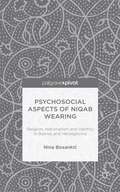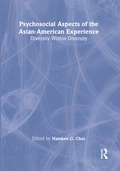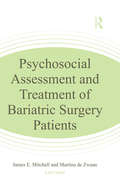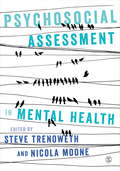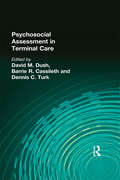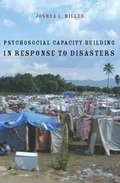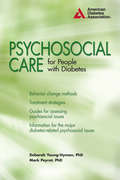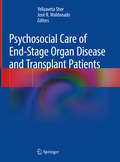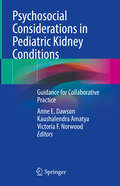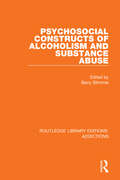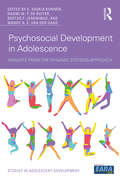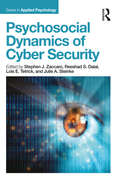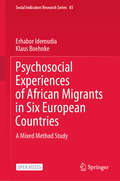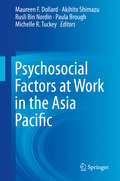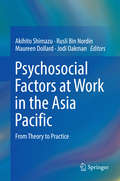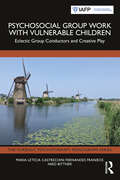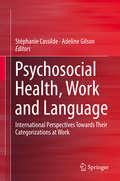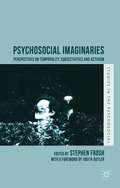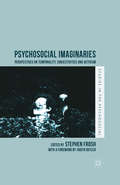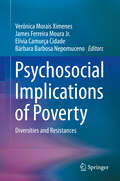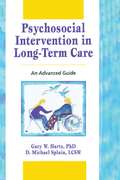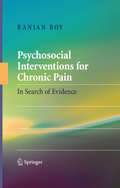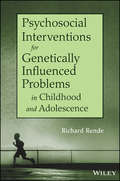- Table View
- List View
Psychosocial Aspects of Niqab Wearing: Religion, Nationalism and Identity in Bosnia and Herzegovina
by Nina BosankićIn Psychosocial aspects of niqab wearing Nina Bosankic explores the various motives which lead young women living in post-conflict Bosnia and Herzegovina to adopt the niqab (full face veil). She uses a grounded theory approach to examine this decision which is often viewed as controversial from both within and outside Islam.
Psychosocial Aspects of the Asian-American Experience: Diversity Within Diversity
by Namkee G ChoiDiscover intervention strategies for issues affecting Asian Americans!This important book examines the childhood, adolescence, young adulthood, and aging stages of Asian Americans to help researchers and practitioners offer better services to this ethnic group. Psychosocial Aspects of the Asian-American Experience will help you understand the ethnic and cultural diversity within the Asian-American population and offers both quantitative and qualitative research that may impact social policies and social services for Asian Americans.Representing Chinese, Japanese, Filipinos, Koreans, Asian Indians, Vietnamese, Hmong, Cambodians, and native-born Hawaiians, this helpful book covers a wide span of individual ethnic identities in order to represent the scope of the Asian-American subculture.The topics and problems examined in Psychosocial Aspects of the Asian-American Experience include: ethnic identity, acculturation, and cultural orientation psychological adjustment of adoptees attitudes and behavior of adolescents regarding academic achievement social network composition depression and other mental health problems dating violence and domestic abuse substance abuse aging In addition to analyzing these problems, this book also presents culturally competent intervention strategies to assist human services practitioners in offering their clients relevant services that are appropriate for their ethnic backgrounds, beliefs, and experiences. This book is also a valuable resource for researchers, policymakers, and graduate students and faculty members in the areas of social work, sociology, psychology, and ethnic studies.
Psychosocial Assessment and Treatment of Bariatric Surgery Patients
by James E. Mitchell Martina De ZwaanBariatric surgery plays an important role in the treatment of obesity; in this comprehensive resource the worldwide leaders of the field provide the most up-to-date information on the psychosocial issues that affect their patients. Included is an overview and history of surgical procedures, complete with illustrations, practical advice on topics such as physical activity and nutritional care after surgery, and essential information that allows clinicians to assist their clients as much as possible; for example, how pre-weight loss surgery psychosocial evaluations can serve as clinical interventions in their own right, and how structured interviews and questionnaires can be used in multiple contexts such as screening, treatment planning, and prognostic assessment. A distinctive chapter includes an overview of the special issues present in treating adolescents, who increasingly are the target of bariatric surgery procedures. This book is an essential reference for clinicians from the evaluation through the follow-up and aftercare of bariatric surgery patients.
Psychosocial Assessment in Mental Health
by Steve Trenoweth Nicola MoonePsychosocial and holistic approaches to assessment have become a central feature of modern mental health care. This practical and comprehensive book guides students through the theory and practice of psychosocial assessments to help them integrate the data as preparation for the effective planning of treatment and interventions. Key features: step-by-step guide on how to undertake each stage of the assessment process in practice clinical staff and service users voices describing their experiences of the process end of chapter exercises reflections and considerations for practice This is essential reading for pre-registration nursing students and mental health professionals.
Psychosocial Assessment in Mental Health
by Steve Trenoweth Nicola MoonePsychosocial and holistic approaches to assessment have become a central feature of modern mental health care. This practical and comprehensive book guides students through the theory and practice of psychosocial assessments to help them integrate the data as preparation for the effective planning of treatment and interventions. Key features: step-by-step guide on how to undertake each stage of the assessment process in practice clinical staff and service users voices describing their experiences of the process end of chapter exercises reflections and considerations for practice This is essential reading for pre-registration nursing students and mental health professionals.
Psychosocial Assessment in Terminal Care
by Dennis Turk Barrie Cassileth, Phd David M DushHere is one of the few books that elucidates the wide range and complexity of special concerns intrinsic to the assessment of terminally ill patients and their families. Health care experts discuss psychosocial assessment and measurement and the ability of clinicians to accurately assess and track psychosocial functioning of patients and their families. Each chapter examine specific methodological considerations in terminal care. Several important content areas are discussed at length, including assessment of pain, assessment of distress in children, evaluation of cognitive functioning, and measurement of patient and family satisfaction.
Psychosocial Capacity Building in Response to Disasters
by Miller Joshua L.Disaster responders treat more than just the immediate emotional and psychological trauma of victims: they empower individuals and families to heal themselves long into a disaster's aftermath. This requires helping survivors to rebuild their ability to meet their emotional and psychological needs, not only for themselves but also for others, which necessitates a careful consideration of survivors' social, economic, and political realities as their communities heal and recover. This comprehensive book integrates Western mental health approaches and international models of psychosocial capacity building within a social ecology framework, providing practitioners and volunteers with a blueprint for individual, family, group, and community interventions. Joshua L. Miller focuses on a range of disasters at local, regional, national, and international levels. Global case studies explore the social, psychological, economic, political, and cultural issues affecting various reactions to disaster and illustrate the importance of drawing on local cultural practices to promote empowerment and resiliency. Miller encourages developing people's capacity to direct their own recovery, using a social ecology framework to conceptualize disasters and their consequences. He also considers sources of vulnerability and how to support individual, family, and community resiliency; adapt and implement traditional disaster mental health interventions in different contexts; use groups and activities to facilitate recovery as part of a larger strategy of psychosocial capacity building; and foster collective grieving and memorializing. Miller's text examines the unique dynamics of intergroup conflict and the relationship between psychosocial healing, social justice, and peace and reconciliation. Each chapter ends with a mindfulness exercise, and a section reviews practitioner self-care.
Psychosocial Capacity Building in Response to Disasters
by Joshua MillerDisaster responders treat more than just the immediate emotional and psychological trauma of victims: they empower individuals and families to heal themselves long into a disaster's aftermath. This requires helping survivors to rebuild their ability to meet their emotional and psychological needs, not only for themselves but also for others, which necessitates a careful consideration of survivors' social, economic, and political realities as their communities heal and recover.This comprehensive book integrates Western mental health approaches and international models of psychosocial capacity building within a social ecology framework, providing practitioners and volunteers with a blueprint for individual, family, group, and community interventions. Joshua L. Miller focuses on a range of disasters at local, regional, national, and international levels. Global case studies explore the social, psychological, economic, political, and cultural issues affecting various reactions to disaster and illustrate the importance of drawing on local cultural practices to promote empowerment and resiliency. Miller encourages developing people's capacity to direct their own recovery, using a social ecology framework to conceptualize disasters and their consequences. He also considers sources of vulnerability and how to support individual, family, and community resiliency; adapt and implement traditional disaster mental health interventions in different contexts; use groups and activities to facilitate recovery as part of a larger strategy of psychosocial capacity building; and foster collective grieving and memorializing. Miller's text examines the unique dynamics of intergroup conflict and the relationship between psychosocial healing, social justice, and peace and reconciliation. Each chapter ends with a mindfulness exercise, and a section reviews practitioner self-care.
Psychosocial Care for People with Diabetes
by Mark Peyrot Deborah Young-HymanPsychosocial Care for People with Diabetes describes the major psychosocial issues which impact living with and self-management of diabetes and its related diseases, and provides treatment recommendations based on proven interventions and expert opinion. The book is comprehensive and provides the practitioner with guidelines to access and prescribe treatment for psychosocial problems commonly associated with living with diabetes.
Psychosocial Care of End-Stage Organ Disease and Transplant Patients
by Yelizaveta Sher José R. MaldonadoTh is book takes an integrated, evidence-based approach the psychiatricaspects of organ transplantation. Unlike any other text currently on the market, this title presents the core principles of transplant psychiatry through an organ-based structure that includes the heart, lungs, liver, GI organs, kidney, composite tissue, and other key areas of transplantation. Each section is divided into chapters discussing psychosocial, medical, and surgical considerations prior to and post-transplant, such as indications leading to a particular type of transplantation, medical course and complications aft er transplantation, psychiatric and psychosocial considerations before and aft er transplantation, history of each type of organ transplant, and any other special considerations. Th e text ends with special topics in care, including psychopharmacology, substance abuse, psychosocial evaluation of recipients and donors, ethical considerations, cross-cultural aspects, and building the transplant psychiatry practice. It includes excellent learning tools, including over 140 tables and figures for ease of use.Written by interdisciplinary experts, Psychosocial Care of End-Stage Disease and Transplant Patients is a valuable resource for students and medical professionals interested in psychiatry, psychology, psychosomatic medicine, transplant surgery, internists, hospital administrators, pharmacists, nurses, and social workers.
Psychosocial Considerations in Pediatric Kidney Conditions: Guidance for Collaborative Practice
by Anne E. Dawson Kaushalendra Amatya Victoria F. NorwoodThis book explores the psychosocial impacts of the kidney disease process and treatments on pediatric patients, including child development, schooling, coping, and resilience. Chronic illnesses and invasive treatments can be particularly impactful on children’s development and identity formation, and a multidisciplinary treatment model that takes psychosocial considerations into account is imperative for patients’ overall wellbeing. This book covers both specific disease-related concerns, including dialysis, transplantation, and nutrition, and broader issues such as collaborating with schools, supporting families, advocacy, and the transition to adult healthcare. Written by experts in a rapidly developing area, this book is an excellent resource for all people impacted by and involved in caring for pediatric kidney diseases including practicing nephrologists and nephrologists in training, as well as psychosocial providers serving nephrology patients, and even families and patients themselves.
Psychosocial Constructs of Alcoholism and Substance Abuse (Routledge Library Editions: Addictions #Vol. 2, No. 4)
by Barry StimmelOriginally published in 1983, in an attempt to provide a broader knowledge base to aid both treatment and prevention, experts examine topics such as the need for an holistic approach to therapy, sexual functioning, drug abusing youths in inner city neighbourhoods, the role of the family, and much more.
Psychosocial Development in Adolescence: Insights from the Dynamic Systems Approach (Studies in Adolescent Development)
by E. Saskia Kunnen Naomi M. Ruiter Bertus F. Jeronimus Mandy A. GaagOver recent years, it has become clear that group-based approaches cannot directly be used to understand individual adolescent development. For that reason, interest in dynamic systems theory, or DST, has increased rapidly. Psychosocial Development in Adolescence: Insights from the Dynamic Systems Approach covers state-of-the-art insights into adolescent development that have resulted from adopting a dynamic systems approach. The first chapter of the book provides a basic introduction into dynamic systems principles and explains their consequences for the study of psychosocial development in adolescence. Subsequently, different experts discuss why and how we should apply a dynamic systems approach to the study of the adolescent transition period and psychological interventions. Various examples of the application of a dynamic systems approach are showcased, ranging from basic to more advanced techniques, as well as the insights they have generated. These applications cover a variety of fundamental topics in adolescent development, ranging from the development of identity, morality, sexuality, and peer networks, to more applied topics such as psychological interventions, educational dropout, and talent development. This book will be invaluable to both beginner and expert-level students and researchers interested in a dynamic systems approach and in the insights that it has yielded for adolescent development.
Psychosocial Dynamics of Cyber Security (Applied Psychology Series)
by Lois E. Tetrick Reeshad S. Dalal Julie A. Steinke Stephen J. ZaccaroThis new volume, edited by industrial and organizational psychologists, will look at the important topic of cyber security work in the US and around the world. With contributions from experts in the fields of industrial and organizational psychology, human factors, computer science, economics, and applied anthropology, the book takes the position that employees in cyber security professions must maintain attention over long periods of time, must make decisions with imperfect information with the potential to exceed their cognitive capacity, may often need to contend with stress and fatigue, and must frequently interact with others in team settings and multiteam systems. Consequently, psychosocial dynamics become a critical driver of cyber security effectiveness. Chapters in the book reflect a multilevel perspective (individuals, teams, multiteam systems) and describe cognitive, affective and behavioral inputs, processes and outcomes that operate at each level. The book chapters also include contributions from both research scientists and cyber security policy-makers/professionals to promote a strong scientist-practitioner dynamic. The intent of the book editors is to inform both theory and practice regarding the psychosocial dynamics of cyber security work.
Psychosocial Experiences of African Migrants in Six European Countries: A Mixed Method Study (Social Indicators Research Series #81)
by Klaus Boehnke Erhabor IdemudiaThis open access book provides an empirical account of the psychological and social experiences of 3500 African migrants to 6 European countries: Germany, Spain, Italy, The Netherlands, France, and the UK. It discusses the psychosocial motivations for migration from Africa, who migrates where, and stressful pre- and post-migration factors affecting the social and psychological wellbeing of migrants. The book also includes a detailed exploration of posttraumatic stress disorder (PTSD) and posttraumatic stress symptoms (PTSS) among African migrants. Addressing and offering solutions to pre- and post-migration problems in Africa and Europe as well as the problems associated with the perilous journeys involved, this unique study is a must-read for anyone interested in cross-cultural psychology and social science, and particularly in migration and mental health.
Psychosocial Factors at Work in the Asia Pacific
by Maureen F. Dollard Akihito Shimazu Rusli Bin Nordin Paula Brough Michelle R. TuckeyThe past several decades of rapid organizational change and global economic activity beseech a fresh understanding of work conditions and mental health across all nations and regions. This volume addresses psychosocial factors at work, legislation, frameworks, research innovations and common perceptions in the Asia Pacific countries. It presents new research on psychosocial factors at work from an Asia Pacific perspective, introducing exciting new research on workaholism, bullying, work-life balance and conflict, work demands classifications, and psychosocial safety climate. Insights regarding workplace psychosocial factors, worker health and well-being have evolved mainly within North American and European cultural contexts and developed industrial countries. This state of the art account of knowledge development in the Asia Pacific region will stimulate new insights for researchers and policy makers to improve the quality of workers' lives worldwide. "This very informative book highlights the significance and uniqueness of job stress problems encountered by workers of different countries in the Asia Pacific region. Occupational health researchers all around the world will find this book a great inspiration for future research. " Yawen Cheng, ScD, Institute of Health Policy and Management, Taiwan "Initiatives and interventions reported from collaborative projects present useful hints for filling gaps in policies and practices for managing psychosocial risk factors in diverse work-life situations in the Asia Pacific region". Dr. Kazutaka Kogi, President, International Commission of Occupational Health
Psychosocial Factors at Work in the Asia Pacific
by Akihito Shimazu Rusli Bin Nordin Maureen Dollard Jodi OakmanThe past several decades of rapid organizational change and global economic activity beseech a fresh understanding of work conditions and mental health across all nations and regions. This volume addresses psychosocial factors at work, legislation, frameworks, research innovations and common perceptions in the Asia Pacific countries. It presents new research on psychosocial factors at work from an Asia Pacific perspective, introducing exciting new research on workaholism, bullying, work-life balance and conflict, work demands classifications, and psychosocial safety climate. Insights regarding workplace psychosocial factors, worker health and well-being have evolved mainly within North American and European cultural contexts and developed industrial countries. This state of the art account of knowledge development in the Asia Pacific region will stimulate new insights for researchers and policy makers to improve the quality of workers' lives worldwide. "This very informative book highlights the significance and uniqueness of job stress problems encountered by workers of different countries in the Asia Pacific region. Occupational health researchers all around the world will find this book a great inspiration for future research. " Yawen Cheng, ScD, Institute of Health Policy and Management, Taiwan "Initiatives and interventions reported from collaborative projects present useful hints for filling gaps in policies and practices for managing psychosocial risk factors in diverse work-life situations in the Asia Pacific region". Dr. Kazutaka Kogi, President, International Commission of Occupational Health
Psychosocial Group Work with Vulnerable Children: Eclectic Group Conductors and Creative Play (ISSN)
by Maria Leticia Castrechini Fernandes Franieck Niko BittnerPsychosocial Group Work with Vulnerable Children presents a simple, accessible, and preventative approach to psychotherapeutic interventions.The authors explore how this form of group work can strengthen resilience and prevent an increase in antisocial behavioural tendencies among children. Based on a process of shared meaning communication, the book explains how professionals can help children to engage in in-group creative play and allow them to experience their self in relation to others. Castrechini-Franieck and Bittner draw on their experiences of working with children in groups, supplemented with therapeutic elements from Gestalt therapy and ontological psychoanalysis. This approach helps children to achieve a stable state of emotional well-being while improving their behaviour at school, along with their social skills.Psychosocial Group Work with Vulnerable Children will be a key reading for psychotherapists and other professionals working with vulnerable children including psychologists, psychiatrists, and social workers.
Psychosocial Health, Work and Language
by Stéphanie Cassilde Adeline GilsonThis volume deals with the construction of categorizations of health at work on the basis of individuals' perceptions and analyses of the psychosocial health effects at their work. The volume approaches the subject from the point of view of those who have experienced psychosocial risks at work, either by being under constraints themselves or by being witness to such constraints. Each chapter sheds light on their representations by examining how the individuals label these constraints. The book compares official categorizations of psychosocial health effects of work to unofficial categorizations, built or expressed. It shows how taking into account subjective narratives may reinforce existing strategies. By giving a central place to language in the analysis of the representations of psychosocial health at work, the volume provides additional information about the various prevention and coping strategies that can be used for dealing with the issue. Beyond some international comparisons, the book covers various national case studies, including in Argentina, Belgium, Canada, Chechnya, France, Germany, the Netherlands, Japan, and Russia.
Psychosocial Imaginaries: Perspectives on Temporality, Subjectivities and Activism (Studies in the Psychosocial)
by Stephen FroshPsychosocial Imaginaries.
Psychosocial Imaginaries: Perspectives on Temporality, Subjectivities and Activism (Studies in the Psychosocial)
by Stephen FroshPsychosocial studies challenges the traditions of psychology and sociology from a genuinely transdisciplinary perspective. The book reflects this agenda in its varied theoretical and empirical strands, producing a newly contextualised and restless body of understanding of how 'psychic' and 'social' processes intertwine.
Psychosocial Implications of Poverty: Diversities and Resistances
by Verônica Morais Ximenes James Ferreira Moura Jr. Elívia Camurça Cidade Bárbara Barbosa NepomucenoThis book presents a multidimensional, psychosocial and critical understanding of poverty by bringing together studies carried out with groups in different contexts and situations of deprivation in Brazil, Mexico, Paraguay, Nicaragua and Spain. The book is divided in two parts. The first part presents studies that unveil the psychosocial implications of poverty by revealing the processes of domination based on the stigmatization and criminalization of poor people, which contribute to maintain realities of social inequality. The second part presents studies focused on strategies to fight poverty and forms of resistance developed by individuals who are in situations of marginalization.The studies presented in this contributed volume depart from the theoretical framework developed by Critical Social Psychology, Community Psychology and Liberation Psychology, in an effort to understand poverty beyond its monetary dimension, bringing social, cultural, structural and subjective factors into the analysis. Psychological science in general has not produced specific knowledge about poverty as a result of the relations of domination produced by social inequalities fostered by the capitalist system. This book seeks to fill this gap by presenting a psychosocial perspective with psychological and sociological bases aligned in a dialectical way in order to understand and confront poverty. Psychosocial Implications of Poverty – Diversities and Resistances will be of interest to social psychologists, sociologists and economists interested in multidimensional studies of poverty, as well as to policy makers and activists directly working with the development of policies and strategies to fight poverty.
Psychosocial Intervention in Long-Term Care: An Advanced Guide
by Gary W Hartz D Michael SplainThe responsibility of providing mental health evaluations and treatment to nursing home patients is increasingly falling on the shoulders of social services and nursing staff. Psychosocial Intervention in Long-Term Care provides the advanced techniques you, as a caregiver, need for assessing and intervening with psychosocial and behavioral problems in LTC. Targeted to students and staff who are familiar with the basic needs and problems of LTC residents, this book also describes effective ways of documenting assessments and interventions to help you integrate results into the medical record and prepare for state surveys. Psychosocial Intervention in Long-Term Care presents you with information about common mental disorders in LTC, basic counseling techniques, and the three major types of psychiatric medication. You’ll also read about legal issues in the psychosocial arena and learn how to avoid burnout while working in LTC. Best of all, this book shows you how to: use the Geriatric Depression Scale and the Mini Mental Status Exam to screen for depression and dementia design thorough behavioral assessments through use of a tracking grid use results of assessments to set up effective behavioral interventions intervene with specific psychosocial problems, such as aggression document the results of assessments develop effective Resident Assessment Inventories prepare for state surveys and develop plans of correction in response to surveysWhether you’re a graduate student or new practitioner in social work, nursing, or health care administration, you’ll appreciate this book’s practical, hands-on approach to problem solving and its focus on the biopsychosocial model. Only through a thorough assessment of residents’physical, psychological, and social needs can we design effective intervention and provide the care they deserve.
Psychosocial Interventions for Chronic Pain
by Ranjan RoyThis book fills a major gap in the practice literature for healthcare professionals engaged in providing psychosocial care for their patients suffering from chronic pain or illness. Up to now there has been little published material on evidence-based medicine in this field. Roy's book at last provides empirically derived support and understanding of psychosocial problems and explores the efficacy of the interventions available for patient care. A boon for clinical psychologists.
Psychosocial Interventions for Genetically Influenced Problems in Childhood and Adolescence
by Richard RendeHow to weigh genetic factors while choosing the bestpsychosocial interventionsPsychosocial Interventions for Genetically InfluencedProblems in Childhood and Adolescence explores empiricallysupported psychosocial interventions in light of our currentunderstanding of the genome. It considers how interventions may bemodified and enhanced as the products of genomic research continueto expand - and why they offer the most promise for makingsubstantial gains in treatment and prevention.Providing a clear, accessible assessment of our currentknowledge, both of the genome and evidence based treatments,Psychosocial Interventions for Genetically Influenced Problemsin Childhood and Adolescence provides practical advice toclinicians,policy makers, and others invested in treating youngpeople who present with a variety of conditions including anxiety,depression, ADHD, autism, substance abuse, and dyslexia. Rendediscusses the current understanding of genetic etiology ofpsychopathology, and explores the support, or lack thereof, forvarious modes of treatment in light of new genomic knowledge. Theoverall premise is that our advances in genetics will be put tobest therapeutic use by fueling translational psychosocialinterventions.Key points raised include:The need for treating children suffering today, rather thanwaiting for a biological "magic bullet"Discussion of how empirically-supported interventions mesh withgenetic vulnerabilitiesWays in which interventions may change as genetic researchcontinues
